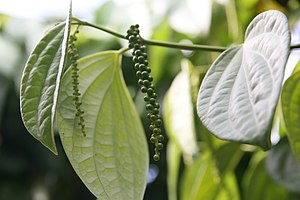후추목
후추목(--目, 학명: Piperales 피페랄레스[*])은 목련군의 목이다.[1] 약모밀과 후추 등을 포함한다.
|
| ||
|---|---|---|
 후추(Piper nigrum) | ||
| 생물 분류ℹ️ | ||
| 계: | 식물계 | |
| (미분류): | 속씨식물군 | |
| (미분류): | 목련군 | |
| 목: | 후추목 Piperales Bercht. & J.Presl, 1820 | |
학명이명 | ||
| 과 | ||
|
| ||
하위 분류
편집계통 분류
편집다음은 목련군의 계통 분류이다.[2]
| 목련군 |
| ||||||||||||||||||
2016년 APG IV 분류 체계에서는 쥐방울덩굴과, 후추과, 삼백초과를 포함하는 후추목을 속씨식물군 목련군 아래에 분류하며,[3] 이는 2009년 APG III 분류 체계, 2003년 APG II 분류 체계 및 1998년 APG 분류 체계의 분류와 동일하다.[4][5][6] 다만 APG III 및 그 이전 분류 체계에서 후추목 아래에 분류되었던 락토리스과(Lactoridaceae), 족도리풀과(Asaraceae), 히드노라과(Hydnoraceae)가 APG IV 분류 체계에서는 쥐방울덩굴과에 병합되었다.[3][4][5][6]
1981년 크론퀴스트 분류 체계는 후추목을 목련문(Magnoliophyta[=속씨식물]) 목련강(Magnoliopsida[=쌍떡잎식물]) 목련아강(Magnoliidae) 아래에 분류했으며, 하위에 삼백초과(Saururaceae), 홀아비꽃대과(Chloranthaceae), 후추과(Piperaceae)를 두었다.[7]
1964년 엥글러 분류 체계는 후추목을 관상식물문(Siphonogamae[=종자식물]) 속씨식물아문(Angiospermae) 쌍떡잎식물강(Dicotyledoneae) 이판화아강(Archychlamydeae) 아래에 분류했으며, 하위에 락토리스과(Lactoridaceae), 삼백초과(Saururaceae), 홀아비꽃대과(Chloranthaceae), 후추과(Piperaceae)를 두었다.[8]
1935년 베트슈타인 분류 체계는 후추목을 속씨식물아문(Angiospermae) 쌍떡잎식물강(Dicotyledones) 이판화아강(Choripetalae) 무판화군(Monochlamydeae) 아래에 분류했으며, 하위에 후추과(Piperaceae)를 두었다.[9]
각주
편집- ↑ Berchtold, Bedřich Všemír von & Presl, Jan Svatopluk. O Prirozenosti Rostlin 261. 1820.
- ↑ Angiosperm Phylogeny Group (2016). “An update of the Angiosperm Phylogeny Group classification for the orders and families of flowering plants: APG IV”. 《Botanical Journal of the Linnean Society》. doi:10.1111/boj.12385. 2016년 4월 1일에 확인함.
- ↑ 가 나 Angiosperm Phylogeny Group; Byng, James W.; Chase, Mark W.; Christenhusz, Maarten J. M.; Fay, Michael F.; Judd, Walter S.; Mabberley, David J.; Sennikov, Alexander N.; Soltis, Douglas E.; Soltis, Pamela S.; Stevens, Peter F. (2016). “An update of the Angiosperm Phylogeny Group classification for the orders and families of flowering plants: APG IV” (PDF). 《Botanical Journal of the Linnean Society》 (영어) 181 (1): 1‒20. doi:10.1111/boj.12385.
- ↑ 가 나 Angiosperm Phylogeny Group; Bremer, Birgitta; Bremer, Kåre; Chase, Mark W.; Fay, Michael F.; Reveal, James L.; Soltis, Douglas E.; Soltis, Pamela S.; Stevens, Peter F. (2009). “An update of the Angiosperm Phylogeny Group classification for the orders and families of flowering plants: APG III” (PDF). 《Botanical Journal of the Linnean Society》 (영어) 161 (2): 105‒121. doi:10.1111/j.1095-8339.2009.00996.x.
- ↑ 가 나 Angiosperm Phylogeny Group; Bremer, Birgitta; Bremer, Kåre; Chase, Mark W.; Reveal, James L.; Soltis, Douglas E.; Soltis, Pamela S.; Stevens, Peter F. (2003). “An update of the Angiosperm Phylogeny Group classification for the orders and families of flowering plants: APG II” (PDF). 《Botanical Journal of the Linnean Society》 (영어) 141 (4): 399‒436. doi:10.1046/j.1095-8339.2003.t01-1-00158.x.
- ↑ 가 나 Angiosperm Phylogeny Group; Bremer, Kåre; Chase, Mark W.; Stevens, Peter F. (1998). “An Ordinal Classification for the Families of Flowering Plants” (PDF). 《Annals of the Missouri Botanical Garden》 (영어) 85 (4): 531‒553. doi:10.2307/2992015.
- ↑ Cronquist, Arthur (1981). 《An Integrated System of Classification of Flowering Plants》 (영어). New York: Columbia University Press. ISBN 9780231038805.
- ↑ Engler, Adolf (1964). Melchior, Hans; Werdermann, Erich, 편집. 《Syllabus der Pflanzenfamilien》 (독일어). Berlin: Gebrüder Borntraeger Verlag.
- ↑ Wettstein, Richard, Ritter von Westersheim (1935). 《Handbuch der systematischen Botanik》 (독일어) 4판. Leipzig: Franz Deuticke.
| 이 글은 후추목에 관한 토막글입니다. 여러분의 지식으로 알차게 문서를 완성해 갑시다. |